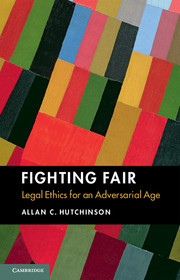6 - In the Name of Just Ends
Published online by Cambridge University Press: 05 August 2015
Summary
In understanding and evaluating what people do, it is important to appreciate the larger context and circumstances in which they act. What will be appropriate in one situation may not be acceptable in another. Although there might well be some ways of acting that are treated as immoral in all circumstances (e.g., torture?), few take the view that certain actions are irredeemably and always unethical outside the context in which they are taken. For instance, while telling lies may be generally frowned upon as an approved course of moral conduct, it may be deemed permissible and even encouraged in certain extreme situations where the consequences of not telling lies are particularly draconian (e.g., life and death). In more strictly philosophical terms, this references the contested relation between means and ends: In what circumstances do certain ends justify the use of certain means that might otherwise be thought unethical? This conundrum is at the heart of any ethical debate. Not surprisingly, it has particular salience for the application of military ethics in the area of legal ethics and professional responsibility.
GOING TO WAR
Not all wars are created equal. The Just War tradition is built on the bedrock stance that there is and must be a distinction between just and unjust wars. However, as with all ethical traditions, there is a continuing and heated debate within the ‘just war’ community about the precise conditions that must be satisfied to justify recourse to war if an ethical imprimatur is to be given to its prosecution and continuance. Nevertheless, although there is controversy about their precise meaning and scope, the basic criteria seem to be generally agreed upon.
- Type
- Chapter
- Information
- Fighting FairLegal Ethics for an Adversarial Age, pp. 72 - 87Publisher: Cambridge University PressPrint publication year: 2015



